

PopEntertainment.com >
Feature Interviews - Actors >
Feature Interviews K to O
>
Feature Interviews P to T > Tim Robbins and
Derek Luke
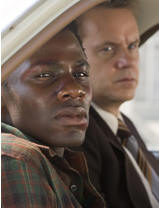 TIM
ROBBINS AND DEREK LUKE
TIM
ROBBINS AND DEREK LUKE
THE TWO SIDES
OF CATCH A FIRE
BY JAY S. JACOBS
Copyright ©2006 PopEntertainment.com. All rights reserved.
Posted:
October 27, 2006.
In
any revolution, there are many foot soldiers – normal people who are
pushed too far and play a vital role in the changing world values. The
people like Nelson Mandela and Archbishop Tutu may have played a larger
role, but there were many others who helped them get their word out
to the people.
Patrick Chamusso is one of these small, vital stories who played a huge
role in the fall of apartheid in South Africa in the 1980s. Chamusso was
a completely apolitical worker at Johannesburg’s largest refinery. He
loved his wife and children and football. Everything changed when he was
mistakenly picked up to be questioned on a terrorist bombing.
Chamusso was tortured by the police and when he could not give information
he did not have, his wife was also imprisoned and tortured. Eventually
the police realized he was innocent and set them free.
This experience changed his viewpoint and Chamusso approached Joe Slovo –
one of the few whites in the revolution, with a plan to destroy the
refinery which symbolized South African affluence and
oppression.
Because of his plan, Chamusso ended up spending eleven years on Robben
Island, the South African prison colony which also held Nelson Mandela.
When apartheid was finally dismantled, Chamusso was freed along with all
the other inmates of the island. In the years since, he has built an
orphanage to house poor African children.
Over the years, he was periodically contacted by Shawn Slovo – daughter of
rebellion member Joe and now a successful screenwriter – about getting
Chamusso’s story on film.
“Her father approached me when I was released from Robben Island. He told
me that his daughter wants to write something about you,” Chamusso
recalls.
However, over the years he assumed that it would never happen. “I forgot
about it,” Chamusso acknowledges. “Especially when the man who spoke with
me – Joe Slovo – died in 1995. I said everything is gone. His children
are going to forget about me. They might be doing a movie about Mandela
or Zulu or about Winnie Mandela – those famous people. Usually, they
never write a story of a person like myself.”
Now, fifteen years after his release, Patrick Chamusso’s story is finally
reaching movie screens. Playing Chamusso is American actor Derek Luke,
who previously starred in Antwone Fisher, Friday Night Lights and
Glory Road.
At first, the subject of the film had his doubts about the
casting, but he quickly was swayed.
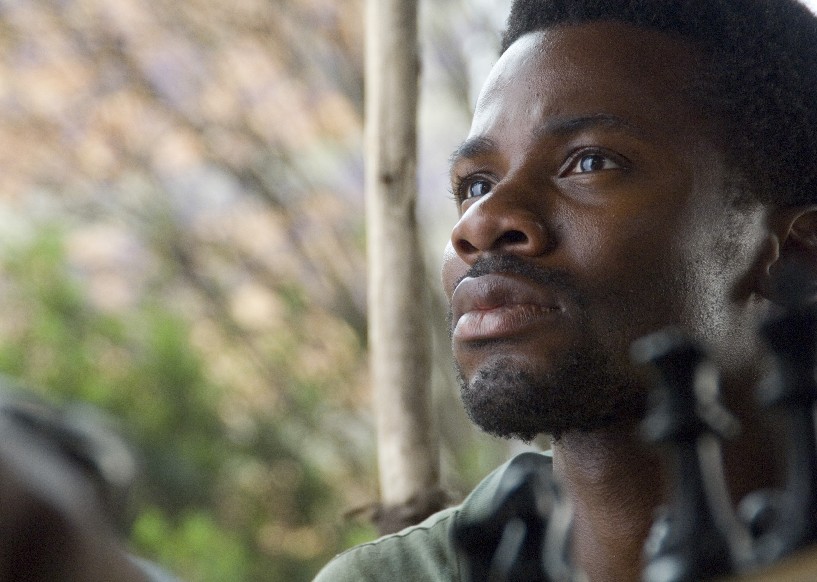 “Derek
Luke did wonderful work,” Chamusso says. “When I was told the actor is
coming, I was not expecting a person like Derek Luke. I was expecting
somebody like Denzel Washington or Cuba Gooding or maybe Samuel Jackson.”
Chamusso laughs. ”A big actor. But, according to my class – lower class
– I said, okay, he’s not a big actor, I don’t know him, but let me just
meet him. I met him and we spoke and I didn’t really like him [at first],
but after fifteen minutes I knew – no, the man is good.”
“Derek
Luke did wonderful work,” Chamusso says. “When I was told the actor is
coming, I was not expecting a person like Derek Luke. I was expecting
somebody like Denzel Washington or Cuba Gooding or maybe Samuel Jackson.”
Chamusso laughs. ”A big actor. But, according to my class – lower class
– I said, okay, he’s not a big actor, I don’t know him, but let me just
meet him. I met him and we spoke and I didn’t really like him [at first],
but after fifteen minutes I knew – no, the man is good.”
Chamusso’s nemesis, South African policeman Nic Vos, was played by Academy
Award winning actor, writer and director Tim Robbins (The Shawshank
Redemption, Dead Man Walking, Bull Durham).
Stars Tim Robbins and Derek Luke sat down with us in the famous
Waldorf-Astoria Hotel in New York to discuss their film.
Could you relate to
Patrick’s ability to forgive after being abused so horrendously?
Tim Robbins:
I can admire it. I can relate to it. I hope that I would have the same
generosity of spirit, presented with the same challenge.
Derek Luke:
We were on the set and
there were two technical advisors. There was Tim’s, his name was Henke.
My guy was Neff. Neff had a life mirrored to Patrick, Henke was an actual
torturer who has gone through truth and reconciliation. We’re trying to
do this scene and I don’t know the name of the torture, but it could have
been called the Helicopter, because helicopters, when you’re elevated on
your toes and held behind your back… So anyway, we were having problems
doing it. So these two guys walked in. Henke was just almost… you know,
as if you’re in the room and someone’s trying to do something and it’s oh,
no, you do it this way. Henke just nonchalantly, unconsciously, grabs
Neff. Neff’s eyes bulged. I looked and I asked Neff, how can you forgive
this man? He said, “Because the power is not in the hand of the
oppressor. I was the victim, but I’m at peace.”
Tim Robbins:
You know, it wasn’t pleasant. I had to spend hours with Henke. I didn’t
like it. He’d keep pissing me off at times and I had to hold on to
that. It wasn’t my job to admonish him. We’d get into discussions and at
times I’d feel like he was rationalizing something and I’d try to bust him
on it. But I realized that I’ve got to get him for who he is. I can’t
have a debate with him. That’s not my job. In a way, it’s the kind of
thing – I used to be able to do a lot more when I wasn’t famous. But, I
would run into a guy at a bar and he’d say some racist thing to me and
instead of getting into a debate with him, I would let him know that it
was okay for him to say that, in an effort to find how deep he would go,
in a way to find the heart of the hatred. I remember a couple of times at
bars just throwing back stuff at him, in an effort to try to discover
something about the nature, the core. I kind of had to do that in South
Africa, too. I had to let them know it was okay to show me who they
really were.
You were very young
when apartheid ended. How much did you know about that time and place
before getting involved in the movie?
Derek Luke:
Very little. My dad is
from Georgetown, Guyana, South America. When I told him I was coming to
do the film, I got really excited and angry at the same time. Because I
said I’m going to
South Africa
and I say, have you been, because he traveled the world. He said, “I
couldn’t get in.” I say, what do you mean you couldn’t get in? He said,
“Yeah, I tried to go in the 80s, but I couldn’t get in.” I was like, you
knew about this? And you didn’t tell me? To me, that started a whole new
revelation.
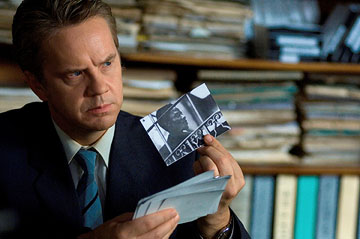 How did you get into
the mind of someone as vicious as Vos?
How did you get into
the mind of someone as vicious as Vos?
Tim Robbins:
Well, you know, it’s a complicated role. Africa is so complex. I felt
like my job was to find the humanity in this guy that we’d consider, from
our safe distance, to be the evil guy, as I did, in the 80s when I was
marching and going to rallies to free Mandela, against apartheid. I
didn’t really understand or give much thought to who the oppressor was.
When you land on that soil and you meet all these people, you have to
invest in them some kind of humanity. You can’t just say you’re evil and
that’s the end of the story. So you have to discover the journey from
Holland, fleeing religious persecution, landing in the south of
Africa, Capetown. Being forced out of there by the British.
Landing in an unsettled area that later will become
Johannesburg. That
entire journey, in covered wagons, is historic for them. It’s their
Diaspar. You start opening their mind to their story and understand they
were pitted one against the other by the British. Only the British can do
this idea of triangulation, or divide and conquer. You know, let’s make
those two fight so we can take all the money. (laughs) They did
that there as well. So I guess what the short answer is, ultimately it’s
a tragic story. These police officers were caught up in the story and on
the losing end of this particular history. It doesn’t justify or
rationalize anything they did, it’s just someone had to do that job at
that time and they all, I think, understood at the time that they were
doing it, that there was something wrong about apartheid. Their choice
was enforce the law, do the job, or leave. To leave would be to abandon
your country or family. To be a traitor.
You mentioned earlier
that your character was a bad guy and it was a difficult role to get
into. What was it that drew you to this project?
Tim Robbins:
A couple of things. [Director] Phillip Noyce, whose work I really like. I felt it’s
a special person who has really successful movies – Patriot Games, A
Clear and Present Danger – then decides to do The Quiet American.
And then decides to do Rabbit-Proof Fence. Or is it the other
way around? I know how Hollywood works. They’re all going, “All right!
We’re on it. Action-adventure, here we go! Do another one.” And he
goes, “You know what? No, thanks. I’ve got this story I want to tell.”
So, immediately, before I met him, I knew there’s got to be something
special about him. The other was just reading that script. It was
great. That ending. Also Working Title, which
I’ve worked with in the past. They produced Dead Man Walking.
Helped me with Bob Roberts. I think they did Hudsucker [Proxy],
too.
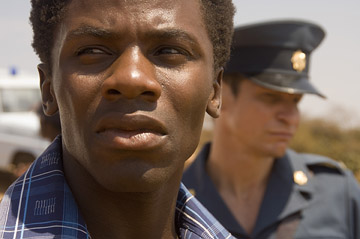 When you were told
about this project, how did you react? How did you feel about the
experience?
When you were told
about this project, how did you react? How did you feel about the
experience?
Derek Luke:
Okay, it was a cold
summer night… (laughs) Friday, I heard about the script. My
agents, they told me about it. I credit them, because they’re really good
people. They called me and you can hear – like being an actor, or being
on the other side of an agent’s phone is really interesting because you
hear – you have to be a master of tones. Because they start high and then
they go low. “Derek, you know, Phillip Noyce and they are really excited
about you. And they really want to…” and then they say, “see you.” I’m
like, see me… aagghhh… “Yeah, Derek, I think it’s a really good role,”
or he’ll say “I haven’t read it yet, I think you should go in for it.”
They don’t say you should read for it. You should go in for it…
So you don’t have it
yet…
Derek Luke:
I’m a person that,
methodically I would focus all my attention on this one thing. So it took
me a weekend. I went in. I sat outside the office, contemplating going
in. Because, at first I thought that this was similar to Antwone
Fisher… you know, there’s a lot of
actors I aspire to. Not just black versus white, I just like their body
of work. I said, man, am I doing it? Am I being like the other
champions? Then somebody called me and
said, “Get out your head. You’re crazy. Go and audition.” So I went and
I went in, auditioned for Phillip. I did the scene where Patrick
discovers his wife for the first time. It was really heavy. Then,
Phillip pats me on my head and gives me some hot tea. I was thinking,
what is this, international casting day? What is this all about? So I
go. He says that I had the role. They didn’t tell me I had the role for
almost another two months. He just told me this two months ago.
Now that’s January and the whole process… already into July, I don’t even
leave to go to Africa. I have a family. I have a wife. And they’re not
giving me any clear answers. I think what my team needed was that Tim
Robbins was the one that really made this film go afloat. It was
humbling, because you can think you’re hot stuff man… People go, “we’re
glad that we have you in an element, but we need…” It was so good because
I felt like I’m in the right place, I’m growing, I want to be around
people like Tim Robbins. So, anyway, I found out later that I got the
role and I’m just excited and then I’m like, oh my God, I’m going to
South Africa.
I’m going to Africa for the first time. So that was my journey. I get so caught up in
this movie, because it’s such a journey for me. So I apologize.
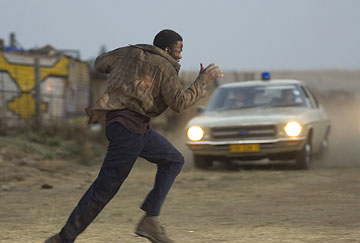 I know you said at
first you thought you may have too much competition. When you decided you
wanted the part, what motivated you?
I know you said at
first you thought you may have too much competition. When you decided you
wanted the part, what motivated you?
Derek Luke:
Just when you have any
people saying you’re crazy, you know? Any people that’s not necessarily
in the business. I’ll go up to my wife and go, babe, am I being
prideful? Am I not being thankful? Is my desire unhumbling? She will go
yes to some parts and no in the other areas. I figure my wife will tell
me the truth. Then other people found out about it and they began to say,
“Derek, you’re going to South Africa.” I said that’s the beautiful part.
There’s just a creative cosmos about the whole thing. I just began to
watch the tapes of South Africa and apartheid and what I did not know
really intrigued me.
Derek, can you talk
about your transformation? Patrick said he was kind of worried that this
American guy would be able to play a South African right.
Derek Luke:
When I got there, they
gave me a dialogue coach. I felt like I was just learning how to spell.
You know, I felt like I’m learning my ABCs. Then they brought me to where
Patrick was. I was a little worried about meeting him, because, you know,
Denzel Washington on Antwone Fisher was very protective of me
meeting the actual person. As a matter of fact, I think I saw Antwone
once or twice when we were filming, but never on the set. Phillip is very
aggressive. He used to play rugby. So it was meeting Patrick and the
dialogue coach. They put me on a diet and asked me to lose about 20
pounds, because during the 1980s there was no 24-hour fitness. I was
going to the gym, just running, which is in my zone and they’re like
Derek, you have to stop. You’re lean, but you need to lose the muscle.
Then they brought me to Robben Island.
How did you lose the
weight? Did you stop eating or…?
Derek Luke:
It would have been
better to do that. But they put me on this diet where for breakfast I had
apples, crushed almonds and a spoon of raw honey. Then for dinner I had
greens; like steamed spinach. Then, I think for dessert I had a salad
with lemon and some raw honey. We did it intentionally for three weeks,
but the whole shoot was more… we had to basically keep our ingredients
down for the whole shoot. So we were there from July to November. Man, I
felt like I want to get on one of them infomercials. Send me a McDonald’s
hamburger. (laughs) Bonnie [Henna] said to me, she said, “Oh, you
lost weight, now your American ego is gone.” I said what??!! (laughs)
I don’t have an ego. She says, “Please. Now you’re in your clothes
and they’re hanging off you. Now you don’t have anything to try to be big
about.” Anyway, that was her comment…
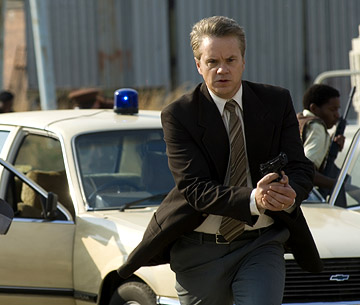 Tim, the whole idea of
when you torture an innocent, apolitical man, it can change his viewpoint
and perhaps turn him into a rebel – that is rather trenchant right now.
Is that one of the things that appealed to you about the story?
Tim, the whole idea of
when you torture an innocent, apolitical man, it can change his viewpoint
and perhaps turn him into a rebel – that is rather trenchant right now.
Is that one of the things that appealed to you about the story?
Tim Robbins:
That’s one of the things when I read the script that I thought was made it
particularly relevant for now. Essentially that bad police work can
create more criminals than you want or desire. But also the ending, you
know? [There’s] not a lot of stories like this, that involve
investigation, police work, certain action elements, where they get to the
final reel and that ending is offered. It’s just not part of the formula
right now. Usually you get the retribution scene, the revenge scene.
When you read scripts and you come to a page or two like that, you go,
wow. That’s bold. That’s beautiful, that they are taking that road. And
in this story, it is the road of
South Africa,
to seek a way towards the future through forgiveness and reconciliation.
A thing I really liked
about the film was… Patrick referred to this… it was a story of the common
guy. It wasn’t about some President or a huge political figure. It was a
common guy who was shackled by the system and totally wronged. Talk about
shooting in South Africa and the poverty, because as Americans we know poverty, but not like
that.
Derek Luke:
We went to the
townships. I went to a township called Alex and Soweto. The average
person doesn’t have running water. Or it’s hard to compare, but right
down the street you have
Beverly Hills
or the West End. Down the street is the townships. It’s daunting,
because I stay over here in a hotel, too. Now I have to go and be with
everybody else. But people were very warm. I think they were more
curious to see whether I identified myself with a South African, being
that I was an African American. They were very curious. I think just
being around them… they may be poor, but everybody is joyous. They sit
around and watch TV and talk about soap operas, just like we do. So those
elements were there to help me.
The thing that I
thought was interesting is that Patrick and all these political prisoners
who were in South Africa were able to forgive. I don’t know if you ever got a chance to meet
Vos, but do these police officers feel guilt or shame over that?
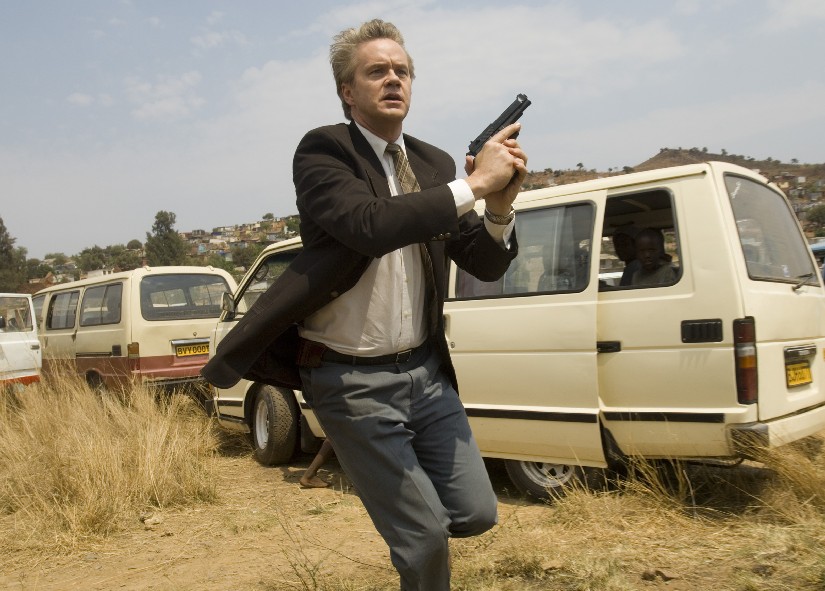 Tim
Robbins:
I would say that the way it’s set up, there’s always a chain of command.
If you’re a foot soldier, you’re being told to do something. These are
foot soldiers. They weren’t making policy. They weren’t passing laws.
They didn’t pass the law about apartheid. There’s always that kind of
distance you can create. That’s something I discovered when I was doing
the death penalty (writing and directing the film Dead Man Walking),
everywhere along the line – from the Governor to the prison guard,
everyone could say it’s my job. I’m just doing my job. So at some point,
I guess you make a moral rationalization. My job. Do they feel guilt
now? Yeah, I think some of them do. I think Henke probably moreso than
others I met, because at least he’s on a journey of renewal. Doing the
movie was part of that. He lost everything. He lost his family, his
standing, his position.
Tim
Robbins:
I would say that the way it’s set up, there’s always a chain of command.
If you’re a foot soldier, you’re being told to do something. These are
foot soldiers. They weren’t making policy. They weren’t passing laws.
They didn’t pass the law about apartheid. There’s always that kind of
distance you can create. That’s something I discovered when I was doing
the death penalty (writing and directing the film Dead Man Walking),
everywhere along the line – from the Governor to the prison guard,
everyone could say it’s my job. I’m just doing my job. So at some point,
I guess you make a moral rationalization. My job. Do they feel guilt
now? Yeah, I think some of them do. I think Henke probably moreso than
others I met, because at least he’s on a journey of renewal. Doing the
movie was part of that. He lost everything. He lost his family, his
standing, his position.
The thing is – being a policeman even in a perfect world is not an easy
job. In a society where there is a strict upholding of the rule of law,
of due process, it’s still a tough job. Because you’re the first on the
murder scene, you’re the first to walk in the door and see the depravity
of a crime. In a society where they’ve thrown out the rule of law, it’s
got to be a much, much tougher job, because there are no rules. So you
can engage in the torture of a human being and that’s your job. You’ve
been asked to do this, by the state. The state is protecting you in doing
it. When you cross that line, you’re asking those people to take an
incredible burden on their shoulders. They know, somewhere inside of
them, they’ve got to know, that what they are doing is wrong. From my
research targeting these people, oftentimes what happens is you take that
compromise, you take that moral weight on your shoulder. You take that
soul-deadening act that you’re doing. And you take it upon yourself out
of duty, out of service, out of love for your family. You know it, you
know you’re doing wrong, but you do it because that’s your job and your
duty. It can be applied to anyone in a war. That is crossing a moral
line. A soldier has to do it all the time. He has to say, okay, thou
shalt not kill, but I’m protecting my people. I’m not going to let my
brother die.
What was it like
working with Tim?
Derek Luke:
Oh, he’s funny. He
took me to my first reggae, hip hop South African club. (laughs)
He was the only white dude there. I said isn’t this the day? The
brothers sitting down watching the white man dance. And he’s 6’5”, so you
can’t hide. Then you’ve got people around saying, “Oh, Shawshank!
Shawshank!”
Tim Robbins:
I’ll tell you exactly what it was. You spend your entire day with white
Afrikaners. (laughs) No, for me it was like those nights were
what Africa was all about.
How were you familiar
with the club?
Tim Robbins:
Well, in the first few days, I went with Phillip. I made Phillip take me,
because he was like, “You have to stay in the white world.” I’m not
staying in the white world. I got to get out. I’m an actor. I’m an
adult. I know the difference between where I’m working. There was this
woman there singing with her band. And it was fantastic. It was this
club that was an integrated club. It was such a great feeling. I would
go back there with friends from the crew. I would try to get people to go
out together. Sometimes they would come. I was dealing with this
character in the day – pretty much in the week. In the weekend I had to
find something culturally that was cleansing.
Derek Luke:
He’s a cool cat and he
has a big heart. He wanted to make sure all the extras were taken care
of. You’d have thought he was an union member or something. He’s a
great guy to be around. Great for a younger actor. He also told me,
“Pace yourself, Derek. You’re going too fast. You do an intense scene,
you need to get a break.” I’m like, yeah, you can say that. But he
helped me navigate through the film.
Derek, did anybody
recognize you from the movies?
Derek Luke:
Yeah, mostly when I was
in the malls. They recognized me from Antwone Fisher or Biker
Boyz and stuff like that, which I thought was kind of odd.
(laughs) But, it was cool. Sometimes I just wanted to be over there
and just be one of them to help me, mentally.
Why did you think it
odd?
Derek Luke:
Patrick was talking
about he thought Denzel was coming, so I thought maybe Denzel or Eddie
Murphy was the only one who reaches South Africa. So I said, man, we need
BET or something over here. (laughs) So I really
didn’t know. But Bonnie kind of gave me a breakdown on what kind of
movies you can see.
Bonnie Henna, who
played your wife here, she did a very good job…
Derek Luke:
Oh, man, Bonnie. She’s
a strong girl. Have you guys talked to her yet? You’ll get a
treat. A very strong, centered female. It was easy to do a scene… you
talk about… she’s sophisticated, beautiful, you’re not really acting,
you’re reacting… You’re like, uh huh. This is easy. She’s a beautiful,
beautiful woman.
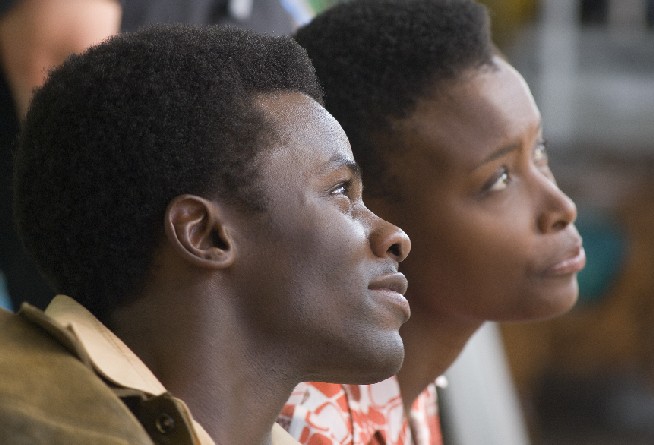 How does your wife feel
about you doing romantic scenes with somebody else?
How does your wife feel
about you doing romantic scenes with somebody else?
Derek Luke:
Well, you know.
(chuckles) Let me ask you… (laughs) Hey, you know
there’s only one way to get the script out of the door and approved. You
have to go through my wife. I come home, she makes sure. She knows
whether my brain was dazzled that day. She’s like, “Derek, how was your
day?” I’m like, I don’t know, it was good. “So, what scene did you do
today?” Ummm, the one in the room, talking to different people. She
isn’t happy.
Did Susan [Sarandon]
come down and visit you at all?
Tim Robbins:
Yeah, the family came down for a couple of weeks. Went on safari. That
was part of the positive side of doing the movie. It started in the
summer, so they could be with me for a part of it.
What’s the best part
about raising teenaged boys?
Tim Robbins:
I don’t know. I’m thrilled by who they’re becoming. It’s really great to
have loose conversations with them. They’re both just really funny and
good-hearted kids.
Tim, how has your
acting changed since you got into directing? Do you have any new projects
as far as that?
Tim Robbins:
I learned a lot from directing. And I haven’t stopped directing, I
stopped directing film, because, actually, one of my kids said, “I like it
better when you act.” Because, I’m around more when I act. It’s a
smaller job. You work eight weeks and you’re done. Directing takes a
good two years out of your life. And I become obsessed and crazy about
it. But I’ve been directing in theater. I’ve done three shows since
2002. That gives me a tremendous amount. I feel like I’m so lucky to
have a laboratory to really test the boundaries – on a scale with a bunch
of people that I really trust and know. And work in the same vocabulary.
I have for 25 years, now. The Actor’s Gang is really a great benefit for
me. So when I do start directing film again, I’m going to be a lot better
than I was the last time.
Derek, you said you did
a journey. Could you tell us where it started, and now where is your mind
– how did it leave you?
Derek Luke:
Well, firstly, the
geographical journey was from Jersey.
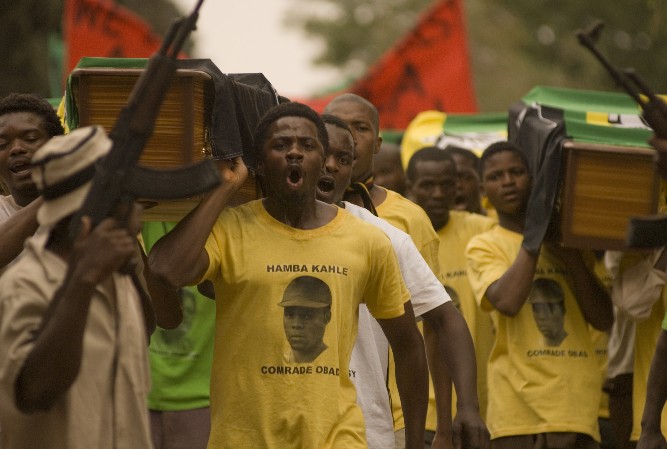 Where are you from in Jersey?
Where are you from in Jersey?
Derek Luke:
Jersey City. I grew up
and went to school with metal detectors. You’ve got this guy in one
element. You go from that to LA and from LA to South Africa. So I’m
thinking that, okay, there are diplomats that go to South Africa. There
are many people, but here I am. You know, I really felt like Alex Hailey
(author of the book Roots), going home. I didn’t know who I was
going home for. I didn’t know what I was going for me. But I knew I was
going home, in a sense. The journey was about humility, about peace. It
was seeing South African people being able to speak nine different
languages, where, literally, I had a problem just learning English. I’m
serious; I mean the drop out rate in my school is enormous. You’ve got
these kids that because of their work environment and the different
people, they had to learn these nine dialects. There’s no choice. So
when you see the richness of the culture… And then at Patrick’s place, I
got a chance to talk to the children. I got emotional; because I think
what influenced my life was the power of words. My mother always, my
uncles always spoke powerful words. I think, even though I grew up in the
hood, I always tell people I really grew up in a rich home, because I had
good words. These kids, necessarily, didn’t have the chance to have these
words. I wanted to figure how to get it to them. I think my discovery
was about myself, but it was important.
How do you stay sane
and focused in what some would call a mindless industry?
Tim Robbins:
Living in New York is a good first step. You don’t really wake up and
live it like you do in LA. It’s kind of… there’s so much going on here.
There’s so many different fields. When you go out – in LA you’re going to
run into someone with a script or and actor… and that’s okay, it’s fun.
Here, you can meet investment bankers. You can meet artists. You can
meet baseball players. It’s an entirely different kind of environment
here. That kind of helps, to live here.
What’s next for you?
Tim Robbins:
I don’t know. I’m looking at stuff. Reading scripts. Saying no,
mostly. Writing some scripts now.
Derek Luke:
Romantic comedy. It’s
an ensemble here; we’re shooting in New York. A large cast. I’m just
glad to be a part of these great actors.
Who
else is in it?
Derek Luke:
Ryan Reynolds, Rachel
Weisz, Isla Fischer, Kevin Kline, Elizabeth Banks.
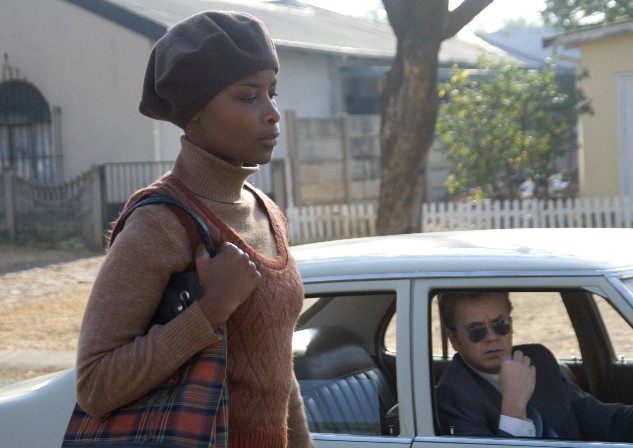 Do you pride yourself
in taking risky projects rather than more commercial ones?
Do you pride yourself
in taking risky projects rather than more commercial ones?
Tim Robbins:
Yeah, one of the things I learned early on is how to say no. Thank God I
did, because it’s hard. It’s hard to say no to a million dollars. It
is. It’s actually, “What are you crazy?” I had to do it the other day.
It was a job that was in Africa. I’d be gone for three months. It was a
ton of money. I looked at being away from home for three months in a
crucial year for both my boys. I thought of hearing about Jack’s
basketball games in Africa. And I said, you know, I just can’t. I can’t
do it. My youngest is fourteen. So in about four years, I’ll become a
total prostitute. (laughs)
Derek, in terms of your
career, this role is vastly different than things you’ve done before. Are
you reaching out and really going for different things? Are you going to
do an action film next week? What are you trying out for?
Derek Luke:
I just like good
stuff. So many actors set the quality tape so high. I think I get it
from them. So yes, action, comedy, all genres, I’m open. I just like the
whole area of expression.
CLICK HERE
TO SEE WHAT DEREK LUKE HAD TO SAY TO US IN 2009!
Email us Let us know what you think.